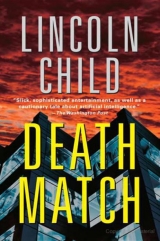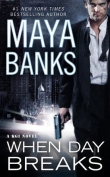
Текст книги "Death Match"
Автор книги: Lincoln Child
Соавторы: Lincoln Child
Жанр:
Триллеры
сообщить о нарушении
Текущая страница: 17 (всего у книги 26 страниц)
THIRTY-SEVEN
In the still gallery far above Madison Avenue, a laser printer came to life: first with the purr of a fan, then the green blink of a light. Its motor chugged briefly and a single sheet slid into the tray.
Richard Silver, who was seated at a small satinwood table in the middle of the vast room, looked up at the sound. A terrycloth towel was draped over his shoulders. He’d been working for nearly twenty hours straight, sketching out the pseudo-code of an immense new program: a program refining interaction with Liza to a point where an EEG hookup would no longer be necessary. Lash had been right: it was time.
Besides, it kept his mind from distressing events – events that, more than anything, he did not want to dwell on.
He glanced in the direction of the printer, like a sleeper roused from a trance. Hardcore computer coding is a state of mind: it can take a lot of time to get “in the zone.” Silver was now deep in the zone and would normally be reluctant to relinquish it. But the paper waiting in the printer’s tray meant only one thing: Liza had completed her task, and completed it early.
He rose, glanced at the clock. Twenty-five minutes after eleven. He walked toward the printer, hesitatingly removed the sheet.
Then he froze.
For a long moment he stood motionless, staring at it. The sunlit gallery was absolutely silent. At last, Silver lowered the paper. His hand shook as he did so.
He stuffed the sheet into a pocket of his sweatpants. Then he crossed the room, opened the hidden door, and ascended the stairs to the next level.
When the black door at the end of the hall sprang open, Silver stepped immediately toward the contoured chair, pinned the microphone to his sweatshirt, and began fixing the electrodes to his temple. Normally, this process was enjoyable, almost meditative: preparation for contacting a more perfect version of himself than he could ever hope to achieve.
Today he felt simply numb.
“Richard,” the low, uninflected voice said from all corners of the room.
“Liza. What is your current state?”
“Ninety-nine point one seven six two percent operational. Current processes are at eighty-six point two percent of multithreaded capacity. Standard operations can now again access one hundred percent of bandwidth. Thank you for asking.”
“You’re welcome.”
“I had not expected to speak with you at the present time. Do you wish to run a scenario? I have completed a variant of the Rift Valley threat-response game that you might find entertaining. Or do you wish to discuss my thoughts on our current book? I have finished analysis of chapter twenty.”
“Not at present. I have the results of your interrogatory. It came in early.”
“Yes. My estimate was off by seventy-one billion machine cycles.”
“Liza, I have just one question. How sure are you of the result?”
With humans, one could always count on a pause when digesting an unexpected comment. With Liza, there was no such pause. “I do not understand your question.”
“Are you sure the result of the interrogatory is not in error?”
“The result shows no statistical deviation. It is what remains when all unsatisfactory results have been discarded.”
“I am not doubting you, Liza. I simply wanted to make sure.”
“Your concern is understandable. Before initiating the process, you stated it was critical to find the solution. I have found the solution. I hope it proves satisfactory.”
“Thank you, Liza.”
“You are welcome, Richard. Shall we talk further?”
“Soon. There’s something I must do first.”
“Thank you for speaking with me.”
Silver punched the shutdown sequence into the keypad, plucked the electrodes from his temples, and got out of the chair. He waited a minute, listening to the sound of his own breathing. Then he wiped his brow with the towel and headed for the door, reaching for his cell phone and dialing as he stepped into the corridor.
“Mauchly here,” came the voice.
“Edwin, it’s Richard.”
“Yes, Dr. Silver.”
“Edwin, I need you up here. Right away.”
THIRTY-EIGHT
The Norman J. Weisenbaum Center for Biochemical Research stood on a point of land jutting into the Hudson south of Cold Spring. Lash pulled into visitors’ parking, hoisted himself out onto the macadam, and glanced up at the long, low structure of glass and stone that climbed the hillside. It was not at all the way he’d pictured it when he called the center the week before, on the flight back from Phoenix. It was unrelievedly modern. And yet somehow it did not seem out of place in this haven of Dutch gables. The rich tones of polished marble blended nicely with the backdrop of oak and sycamore. Waterbirds wheeled and cried overhead.
Inside, the receptionist’s station was manned by three women. Lash approached the closest, presented his card. “Dr. Lash to see Dr. Goodkind.”
“Just a moment, please.” The woman peered into a monitor recessed into her work surface, held a manicured finger to one ear, listened to an invisible earpiece. Then she looked up at him again. “If you’d kindly take a seat, he’ll be right with you.”
Lash had barely settled into one of the chrome-and-leather chairs when he saw Roger Goodkind approaching. Goodkind was carrying a few more pounds since they’d last met, and the sandy hair was receding dramatically from his temples. But the man still had the same sly half-smile, the same loping walk, of their undergraduate days.
“Chris!” Goodkind clasped Lash’s hand in his. “Punctual as ever.”
“Anxiety disorder. Presenting as compulsive timeliness.”
The biochemist laughed. “If only your diagnosis were that simple.” He led Lash toward an elevator. “Can this really be? Hearing from you like this, twice in two weeks? I’m almost prostrate with gratitude.”
“I wish I could say it was a social call,” Lash replied as the elevator opened, “but the fact is I need your help.”
Goodkind nodded. “Anything.”
* * *
Goodkind’s lab was even larger than Lash had anticipated. There were the obligatory lab tables and chemical apparatus, but there were also deep leather chairs, a handsome desk, bookcases full of journals, a stunning view of the river. Lash whistled appreciatively.
“The center’s been kind to me,” Goodkind said with a chuckle. He’d developed a new mannerism since Lash last saw him: he ran his fingers through his thinning hair, then grasped a few strands and tugged on them, as if encouraging growth.
“So I see.”
“Have a seat. You want a diet soda or something?”
Lash let himself be shown to one of the armchairs. “No, thanks.”
Goodkind took a seat opposite. “So what’s up?”
“Remember why I called you last week?”
“Sure. All those crazy questions about suicide among perfectly happy people.”
“Yes. I’m working on something, Roger, something I can’t tell you much about. Can I rely on you to keep it confidential?”
“What is this, Chris? Is it a Bureau matter?”
“In a way.” Lash watched the man’s eyes widen. If Goodkind thought the Feds were involved, he’d be more likely to cooperate.
Goodkind shifted. “I’ll do whatever I can.”
“You do a lot of work with toxicology, right? Drug side effects, interactions, that sort of thing?”
“It’s not my field of expertise, but, yes, we’re all involved with toxicology to some degree at the center.”
“So tell me. What steps would a biochemist go through in developing a new drug?”
Goodkind ran a hand through his thinning hair. “A new drug? From scratch, you mean?” He paused to tug on a lock. “Historically, drug development’s always been kind of hit or miss. You screen molecules and compounds, looking for a ‘hit,’ something that seems beneficial to people. Of course, now with computational chemistry, you can simulate the effects of reactions that—”
“No, I don’t mean that early in the process. Say you’ve already developed a drug, or something you think might be a drug. What’s the next step?”
Goodkind thought a moment. “Well, you do stability testing. See what delivery vehicle it likes best: tablet, capsule, solution. Then you expose the drug molecule to a variety of conditions – relative humidity, UV light, oxygen, heat – make sure it doesn’t degrade, break down into harmful byproducts.” He grinned. “People always keep drugs in their bathroom cabinets, you know, which is probably the worst thing you can do. Heat and moisture can cause all sorts of nasty chemical reactions.”
“Go on.”
“You perform tox studies, qualify the degradation products. Determine what’s acceptable, what’s not acceptable. Then you do a Trap.”
“A what?”
“A Trap. Toxicological risk analysis procedure. That’s what we call it here at the center, anyway. You run the functional groups – the different parts of the drug molecule – against a knowledge base of existing chemicals and pharmaceuticals. You’re essentially looking for adverse reactions that might cause different, and more dangerous, functional groups. Toxicity potential. Carcinogenicity, neurotoxicity, so forth.”
“And if you find such toxic potential?”
“That’s known as a structure alert. Each alert is flagged and studied for severity.”
“I see. And if the drug passes?”
“Then it goes on to clinical trials, first in animals usually, then humans.”
“These structure alerts. Can a drug cause a structure alert and still go on to be developed?”
“Of course. That’s one reason you have warning labels on medicine bottles. ‘Don’t take with alcohol’ and the rest.”
“Are these alerts listed somewhere, in a book? The Physician’s Desk Reference, maybe?”
Goodkind shook his head. “Structure alerts are too low-level, too chemical, for the PDR.”
“So they’re proprietary? Kept secret by individual researchers or pharmaceutical companies?”
“Oh, no. They’re all stored in a central database. Government regulations.”
Lash sat forward slowly. “Who has access to this database?”
“The FDA. Pharmaceutical manufacturers.”
“Biochemistry labs?”
Goodkind inhaled sharply as he realized where Lash was headed. Then he nodded. “With the proper accreditation.”
“The Weisenbaum Center?”
Goodkind nodded again. “In the research library. Two flights up.”
“Mind leading the way?”
Goodkind licked his lips. “Chris, I don’t know. Access to that database is government-sanctioned. You sure this is official?”
“It’s of the greatest importance.”
Still, Goodkind hesitated.
Lash stood up. “Remember what you said when I called? That you couldn’t predict suicide, that it was just a roll of the dice? That it made no sense, for example, why Poland had a drastically higher suicide rate than normal in 2000?”
“I remember.”
“Perhaps you forgot something, a fact I just dug up on my way here. Poland is the country where, because of the low cost to run studies, most drugs were tested in 2000.”
Goodkind thought for a moment. “You mean—?”
“I mean you should show me that toxicology database. Right now.”
Goodkind hesitated just a second longer. And then he, too, stood up.
THIRTY-NINE
The center’s research library did not look like a library at all. It was a low-ceilinged space, uncomfortably warm, its walls lined with carrels of blond wood. Each contained a seat, a desk, and a computer terminal. The room’s only occupant was the librarian, who looked up from her typing to stare suspiciously at Lash.
Goodkind chose a carrel in the far corner. “Where are all the books?” Lash asked in a low voice as he pulled over the chair from the adjoining carrel.
“In the basement stacks.” Goodkind drew the keyboard toward him. “You need to requisition titles from Ms. Gustus, there. But almost everything we need is online, anyway.”
Lash watched as the man typed in his name. A menu appeared, and Goodkind made a selection. The screen refreshed:
FDA – DIVISION R
PBTK
PHARMACEUTICAL AND BIOMEDICAL
TOXICITY KNOWLEDGE BASE
REV. 120.11
LAST UPDATED: 10.01.04
PROPRIETARY AND CONFIDENTIAL. OFFICIALLY SANCTIONED USE ONLY.
UNAUTHORIZED ACCESS CONSTITUTES A FEDERAL CRIME.
ID: ____________
PASSWORD: ____________
Goodkind looked at Lash, who nodded encouragingly. With a shrug, Goodkind completed the fields. A new screen appeared:
FDA – R/PBTK 120.11/00012 10/04/04
ENTER QUERY BY:
1. CHEMICAL COMPOUND
2. TRADEMARK
3. GENERIC
PRESS F1 FOR INDEX:
Goodkind looked over again. “What’s the name of the medication you’re interested in?”
“Scolipane.”
“Never heard of it.” Goodkind tapped a series of keys, and the screen filled with text. “Here it is.”
Lash peered more closely:
FDA – R / PBTK 120.11 / 09817 10/04/04
SCOLIPANE
Hydoxene, 2 – ((6 – (p-methylparapine) phenylchloride) alkaloid) – , sodium salt
MR: PhG
MF: C 23H 5O 5N 3Na
USE: (primary) S. M. R. (secondary) see p. 20
MUTATION DATA: N/R
REPRODUCTIVE REFERENCES: p. 15
SYNONYMS: p. 28
DOSAGE DATA: p. 10
PAGE 1 OF 30

“Biochem was my worst subject at U. Penn. Remember?” Lash looked away from the screen. “Why don’t you hold my hand a little here.”
Goodkind scanned the text. “Scolipane’s primary use is as a skeletal muscle relaxant.”
“A musclerelaxant?”
“It’s a relatively new formulation, about five years old.”
“Dosage?”
“One milligram. A little feller.”
Lash slumped. The theory that had begun to seem so promising started to slip away again.
He glanced back morosely at the top of the screen. Between the chemical description and the formula was a line he didn’t recognize. “What’s ‘MR’ stand for?”
“Manufacturer. They all have codes. You know, sort of like airports. Take this one: PhG. That’s short for PharmGen.”
Lash straightened again.
PharmGen.
He began looking more closely at the data. The acute toxicity chart was a typical feature of such reports; it usually recorded the LD50, or dosage at which half the sample population would die. He ran down the columns.
“Canine mania,” he said quietly. “What the hell?”
“We have to scroll to page twenty for more information.”
“And look – it says to see page twenty for data on human overdosage, as well.” Lash glanced at Goodkind. “Primary use is as a muscle relaxant, you said.”
“Right.”
“But look here. There’s anotheruse. A secondary use.” He pointed at the screen.
“Page twenty again,” Goodkind murmured. “Seems that page has a lot to tell us.”
“Then let’s go.”
Goodkind moused quickly forward, the screen blurring, until he reached page 20. Both men leaned in to read the dense text.
“Jesus,” Goodkind breathed.
Lash said nothing. But he found himself going cold in the overheated room.
FORTY
Tara Stapleton sat behind her desk, motionless except for her eyes. Slowly, she scanned the office, letting her gaze settle on one thing, then another. The plants were watered and carefully pruned; her old fiberglass board leaned against the wall as it always did; the posters, bumper stickers, and other surfing paraphernalia remained in their usual spots. The institutional clock on the far wall told her it was ten minutes to four. Everything was as it should be. And yet everything looked unfamiliar, as if the office had become suddenly foreign to her eyes.
She leaned back slowly in her chair, aware her breathing had grown fast and shallow.
Suddenly the phone rang, its shrill warble shattering the quiet. Tara froze.
It rang again. Two beeps: an outside call.
Slowly, she lifted it from the handset. “Stapleton.”
“Tara?” The voice was rushed, out of breath.
“Tara?” it repeated. “It’s Christopher Lash.”
Street noises filtered from the earpiece: the rush of traffic, the blatt of a truck’s horn.
“Christopher,” Tara said evenly.
“I’ve got to talk to you. Right now. It’s very important.”
“Why don’t you come by my office?”
“No. Not inside. Can’t take the chance.”
Tara hesitated.
“Tara, please.” Lash’s voice was almost pleading. “I need your help. There’s something I have to tell you nobody else can overhear.”
Still, Tara said nothing.
“ Tara. Another supercouple is about to die.”
“There’s a coffee shop around the corner,” she said. “The Rio. On Fifty-fourth, between Madison and Park.”
“I’ll be waiting for you. Hurry, please.”
And the phone went dead.
But Tara did not rise from her desk. In fact, she made no move at all except to replace the phone in its cradle and stare at it, as if struggling with some terrible uncertainty.
FORTY-ONE
Lash walked into the Rio a few minutes after four. The walls were covered in gilt wallpaper, and the incandescent lights and resin-colored banquettes gave the diner a hazy, golden glow. He felt like an insect surrounded by amber.
For a moment, he thought he’d arrived first. But then he caught sight of Tara, sitting at a booth in the rear of the restaurant. He stepped forward and slid into the seat across from her.
A waitress approached; Lash ordered a coffee, waited until she walked away. Then he turned back. “Tara. Thanks for coming.”
Tara nodded.
“Did you talk to that doctor? Moffett?”
Tara nodded again.
“What did he say?”
“He was following instructions from an internal scrip.”
“What does that mean?”
“Medication regimen, based on the findings of an earlier examination.”
“In other words, he was following some other in-house doctor’s orders.”
“Yes.”
“Did he say whose orders?”
“I didn’t ask him that.”
“How easy would it be to fake such orders?”
Tara hesitated. “I’m sorry?”
“Everything at Eden is automated. You get a piece of paper, telling you to do something. Couldn’t somebody type false medical orders into the computer system?”
When Tara did not reply, Lash leaned a little closer. “I don’t have all the answers yet. But I have enough to know it’s not only the remaining supercouples who are in danger. We’re in danger, too.”
“Why?”
“Because somebody – somebody insideEden – has set these women up to kill themselves and murder their husbands.”
Tara began to speak, but Lash quickly held up a suppressing hand. “No. Let me talk first, please. You’re not going to believe it unless I give you a little background.”
Tara relaxed, but only slightly. She was looking at him with shock, even apprehension. Lash glanced toward a nearby mirror and caught a glimpse of himself: haggard, hair askew, tired eyes animated with nervous energy. If he was her, he’d be apprehensive, too.
The waitress returned with his coffee, and Lash took a sip. “That prescription of Lindsay Thorpe’s, for one milligram of scolipane? It was the clue I needed. I spent the afternoon tracking down more information. Did Dr. Moffett tell you what scolipane is normally prescribed for?”
Tara shook her head.
“It’s a muscle relaxant. It works on the area of the brain that controls muscle spasms. Sports medicine doctors use it to treat strains. You say Dr. Moffett was following through on treatment prescribed in an earlier examination. But Tara, what earlier examination could have predictedLindsay Thorpe would strain a muscle?”
“Then scolipane must be used to treat something else.”
“You’re more right than you know. Scolipane wasoriginally intended to treat something else. But that something else was kept a close secret, locked up in drug development databases.”
He paused. “Ever see a TV ad for what sounds like a miracle drug? No more allergies, maybe. Or your high cholesterol, suddenly gone. And then all the side effects go scrolling across the screen… and it’s almost enough to make you swear off medicine forever. Those are just the drugs that makeit past clinical trials. Many others never make it.”
He glanced across the table, but Tara’s expression remained unreadable.
“Okay. Let’s back up. Most aspects of personality are the result of genes controlling neurotransmitters in the brain. That includes undesirable traits like anxiety and depression. So we create drugs to deal with them. Things like SSNRIs, which suppress the reuptake of serotonin. But there are lots of serotonin receptors in the brain. How can you aim a drug at all the receptors at once?”
He took another sip of coffee. “So drug companies have been looking for other solutions. Ways they could alter brain chemistry to achieve better results. Sometimes they venture deep into unknown territory. Such as the neuropeptide known as ‘Substance P.’ ”
“Substance P,” Tara repeated.
“I hadn’t heard of it either, until this afternoon. It’s very mysterious: nobody knows exactly why it’s in the brain, or what its purpose is. But we do know the kind of things that cause it to be released. Acute physical pain. High levels of stress. It’s been closely implicated with severe depression, sudden suicide.”
He leaned closer. “At least one drug company became interested in Substance P. They decided if they could develop a pharmaceutical agent to ‘hit’ Substance P, to block its receptor, maybe they could make a whole lot of depressed people happy again. That drug company was PharmGen. Eden’s parent.”
“Not anymore. Eden is independent now.”
“PharmGen developed a new anti-psychotic drug that acted against Substance P. It had some rough going early on – red flags appeared during toxicology testing – and the drug was remodified. Four years ago, it was finally ready for group testing. The testing was done in Poland, which was common practice. Maybe ten thousand people were involved, all told. Ninety-nine times out of a hundred, the drug worked beautifully. And it wasn’t limited to single indicators: schizoids, borderlines, chronic depressives, all seemed to benefit.”
He sipped his coffee. “But there was a problem: that other one percent. If a person withoutmental illness took the drug – specifically, a person with high levels of serum copper in their blood – terrible side effects resulted. Depression, paranoia, homicidal rage. There were mass instances of suicide, enough to skew the suicide statistics for the entire countrythat year.”
He glanced across the table to gauge the effect. But Tara’s expression remained guarded.
“The drug was withdrawn from testing. But it emerged late the following year, in a drastically lowered dosage, reformulated for another purpose: a muscle relaxant.”
Disbelief returned to Tara’s face. “Scolipane?”
“One-milligram tablets. The original fifty-milligram formulation is also available, but prescribed only in very rare circumstances, under close observation.” He pushed his cup aside. “Remember that call I made just before leaving your office? That was to a friend of mine in the Phoenix field office. I asked him to send somebody to the Thorpes’ house, check on their meds. Lindsay’s prescription for scolipane was on the night table beside her bed. But the dosage had been increased from one to fiftymilligrams. In capsule form, she didn’t notice the difference.”
Tara frowned.
“Somebody changed her dosage. Somebody who knew about the side effects of scolipane in its original formulation. Somebody who knew scolipane wouldn’t set off any alarms in the autopsy blood work. Somebody who also knew – probably from her application form – that Lindsay Thorpe was taking an antihistamine.”
“What are you talking about?”
“When I first began investigating the deaths, I had a talk with Lindsay’s father. He mentioned she had dermatographia. It’s a benign but irritating skin condition that causes itchiness. The recommended treatment is a histamine antagonist. Over time, chronic users of such drugs can develop high-copper histapenia – low levels of histamine in the blood, causing an accumulation of copper.”
Lash was increasingly alarmed by her continued disbelief. “Don’t you understand? When Lindsay Thorpe took that huge dose of scolipane, coupled with her high blood copper, she unwittingly re-created– exactly—the conditions that caused such high suicide in the initial drug trials. Think of the terrible mental ordeal she must have gone through, made all the worse for being sudden, inexplicable. Hostile voices in her head. Acts of psychotic deviance: she found herself playing music she detested on the stereo. Lindsay Thorpe hated opera, you see, but she was listening to opera when she died. All this would be followed by black despair, overwhelming homicidal and suicidal urgings…” He paused. “She loved her husband dearly. But the impulses were irresistible. Still, I think she carried them through with as much dignity, as little pain, as possible.”
When she said nothing, he went on. “I know what you’re thinking. Why did she kill her husband? She didn’t wantto. But she hadto. Yet even as the flood of brain chemicals drove her half mad, her love for Lewis Thorpe remained. And how do you kill somebody you love? As painlessly as possible. And you would go together. That’s why the deaths happened at night: Lindsay could slip a dry cleaning bag over the head of her sleeping husband before slipping one over her own. She probably waited for him to fall asleep in front of the TV. Same with Karen Wilner. She was a librarian, she would have access to scalpels in the book repair lab. A fresh scalpel is so sharp you wouldn’t even feel it opening your vein – not if you were asleep, anyway. But I’ll bet she sliced her own wrist more hesitantly, that’s why it took her longer to die.”
“What about the baby?” Tara murmured. “The Thorpes’ child?”
“You mean, why did she survive? I don’t know the morphology of Substance P well enough to speculate. Perhaps the mother-child bond is too elemental, too primitive, to be broken in such a way.”
Now he reached across the table, took Tara’s hand. “Lindsay may have killed herself and her husband. But this isn’t about that. It’s about first-degreemurder. Somebody inside Eden knew exactly how to make Lindsay Thorpe self-destruct. Somebody knew her medical background, knew about the early tests on scolipane, knew how to create that precise chemical cocktail within her blood. And that somebody had the power to fake a paper trail, doctor her medical orders, even modify her prescription. You said it yourself: it has to be somebody with world-class access to your systems.”
His grip tightened on her hand. “I think you know where this is leading. It’s the answer, the only possibleanswer. And you have to be strong. Because this person mustbe stopped. He got to Karen Wilner the same way. He’s singling out the women, making them self-destruct. In just two days, the third couple will—”
He stopped abruptly. Tara was no longer listening. Her expression had shifted from his face to somewhere else: somewhere over his shoulder.
He turned. Edwin Mauchly was approaching from the front of the diner, surrounded by half a dozen other men. Lash did not recognize them, but he knew they must be Eden security.
Quickly, Tara pulled her hand from his.
Lash, stunned, was slow to react. Within a moment the table was surrounded, the exits blocked.
“Dr. Lash,” Mauchly said. “If you’ll come with us, please?”
As comprehension broke over him he rose instinctively, ready for flight. One of the guards placed a hand on his shoulder and, gently but irresistibly, guided him back into the seat.
“You’ll find things a lot less painful if you cooperate, sir,” the security officer said.
Vaguely, Lash was aware Tara had slipped out of the booth and was now standing behind Mauchly.
A few seconds ticked by. They seemed very long. Lash glanced around the diner. A few faces were turned in his direction, watching with mild curiosity. Then he looked up at the surrounding guards. And then he nodded and – much more slowly – stood. The security staff closed around him, and he felt himself propelled forward.
Mauchly was far ahead now, already leaving the restaurant. One arm was draped protectively around Tara’s shoulders. “I’m sorry you had to be put through this,” Lash heard him say. “But it’s all over. You’re safe.” Then the door closed behind them, the sound cut off, and the two melted into the gathering darkness of Fifty-fourth Street.
Tara vanished without looking back.








